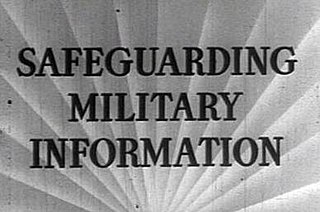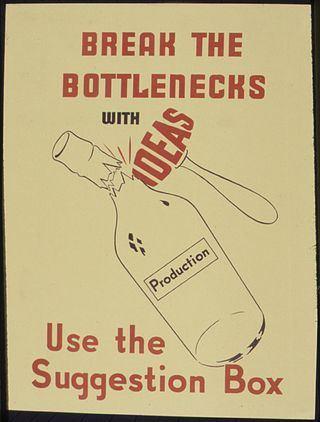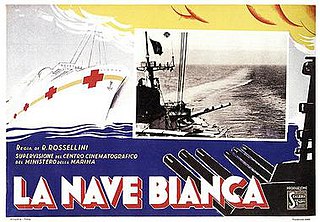Related Research Articles

Der Fuehrer's Face is a 1943 American animated anti-Nazi propaganda short film produced by Walt Disney Productions, created in 1942 and released on January 1, 1943 by RKO Radio Pictures. The cartoon, which features Donald Duck in a nightmare setting working at a factory in Nazi Germany, was made in an effort to sell war bonds and is an example of American propaganda during World War II. The film was directed by Jack Kinney and written by Joe Grant and Dick Huemer. Spike Jones released a version of Oliver Wallace's theme for the short before the film was released.

Titanic is a 1943 German propaganda film made during World War II in Berlin by Tobis Productions for UFA, depicting the catastrophic sinking of RMS Titanic in 1912. Despite the fact that there already was a German silent film produced in 1912 just four weeks after the sinking and a British company had released a German-language film about the disaster in 1929, the film was commissioned by Nazi Propaganda Minister Joseph Goebbels with the intent of showing not only the superiority of German filmmaking, but also as a propaganda vehicle which would depict British and American capitalism as being responsible for the disaster. The addition of an entirely fictional heroic German officer to the ship's crew was intended to demonstrate the superior bravery and selflessness of German men as compared to the British officers.

Mrs. Miniver is a 1942 American romantic war drama film directed by William Wyler, and starring Greer Garson and Walter Pidgeon. Inspired by the 1940 novel Mrs. Miniver by Jan Struther, it shows how the life of an unassuming British housewife in rural England is affected by World War II. Produced and distributed by Metro-Goldwyn-Mayer, its supporting cast includes Teresa Wright, Dame May Whitty, Reginald Owen, Henry Travers, Richard Ney and Henry Wilcoxon.

The New Spirit is a 1942 American animated short film produced by Walt Disney Productions and the U.S. Department of the Treasury, and released by the War Activities Committee of the Motion Pictures Industry. The cartoon, which stars Donald Duck, was the first film created as part of Walt Disney's World War II propaganda production. It was commissioned by Henry Morgenthau Jr., then Secretary of the Treasury, to encourage American citizens to pay their income tax in support of the war effort. The film was directed by Wilfred Jackson and Ben Sharpsteen, and features Clarence Nash as the voice of Donald, Fred Shields as the radio announcer, and Cliff Edwards singing the theme song.
December 7th is a 1943 propaganda documentary film produced by the US Navy and directed by John Ford and Gregg Toland, about the December 7, 1941 attack on Pearl Harbor, the event which sparked the Pacific War and American involvement in World War II. Toland was also the film's cinematographer. The original version of this film, with a running time of 82 minutes, was not released but was retained by the National Archives. An edited version of 32 minutes length, which removed a long introductory segment and a shorter epilogue, was given limited release to specific audiences but won the Academy Award for Best Documentary in 1944. This is the only film Toland ever worked on for which he received a director credit.

Safeguarding Military Information was a short propaganda film produced by the Academy of Motion Picture Arts and Sciences in 1942.

Suggestion Box is a short propaganda film produced in 1943 by the Office of War Information. Its purpose was to encourage workers to send in suggestions for more effective war production.

Friendly Enemies is a 1942 American drama film starring Charles Winninger, Charlie Ruggles, James Craig, and Nancy Kelly. The film was directed by Allan Dwan, adapted from a 1918 play of the same name by Aaron Hoffman and Samuel Shipman. It was nominated an Academy Award in the category of Best Sound Recording.
Between 1941 and 1945, during World War II, Walt Disney was involved in the production of propaganda films for the U.S. government. The widespread familiarity of Disney's productions benefited the U.S. government in producing pro-American war propaganda in an effort to increase support for the war.

Beyond the Line of Duty is a 1942 American short propaganda film, directed by Lewis Seiler. The documentary film reenacted the life and career of United States Army Air Corps Captain Hewitt T. "Shorty" Wheless.
World War II changed the possibilities for animation. Prior to the war, animation was mostly seen as a form of family entertainment. The attack on Pearl Harbor was a turning point in its utility. On December 8, 1941, the United States Army began working with Walt Disney at his studio, stationing Military personnel there for the duration of the war. The Army and Disney set about making various types of films for several different audiences. Most films meant for the public included some type of propaganda, while films for the troops included training and education about a given topic.
Combat Report was a short dramatic propaganda film produced by the U.S. Army Signal Corps in 1942, and shows the anti-submarine efforts of a bombing crew. It was nominated for an Academy Award for Best Documentary Feature in 1942.
Conquer by the Clock was a short dramatic propaganda film produced by the RKO Pathé in 1942 to encourage wartime industrial production. It was nominated for an Academy Award for Best Documentary Feature in 1943.

The Grain That Built a Hemisphere is a 1943 short animated propaganda film about corn produced by Walt Disney for the Office of the Coordinator of Inter-American Affairs. It was nominated for an Academy Award for Best Documentary in 1943.
The Price of Victory is a 1942 short propaganda film produced by Paramount Pictures and the U.S. Office of War Information. It was nominated for an Academy Award for Best Documentary Feature in 1943.
Marines in the Making is a 1942 short propaganda film produced by Metro-Goldwyn-Mayer about the United States Marine Corps. It was nominated for an Academy Award for Best Short Subject, One-reel in 1943.

Don't Talk is a 1942 American short propaganda film, produced for Metro-Goldwyn-Mayer's Crime Does Not Pay series, about the dangers of homefront espionage in wartime. It was nominated for an Academy Award at the 15th Academy Awards for Academy Award for Best Short Subject (Two-reel).

The White Ship is a 1941 Italian war film directed by Roberto Rossellini. Its cast was made up entirely of amateur actors, many of them the real crew of a hospital ship of the Italian navy. The production was a work of propaganda intended to support the war aims of the Fascist Italian regime during the Second World War. It was made with the close co-operation of the Italian Navy, particularly Francesco De Robertis. Vittorio Mussolini, the son of the Italian dictator, was also a supporter of the project.
Claudine West (1890–1943) was a British novelist and screenwriter who was a three-time Academy Award nominee. She moved to Hollywood in 1929, and was employed by MGM on many films, including some of their biggest productions of the late 1930s and early 1940s.
References
- ↑ https://www.imdb.com/event/ev0000003/1943 Awards for 1943 [ user-generated source ]